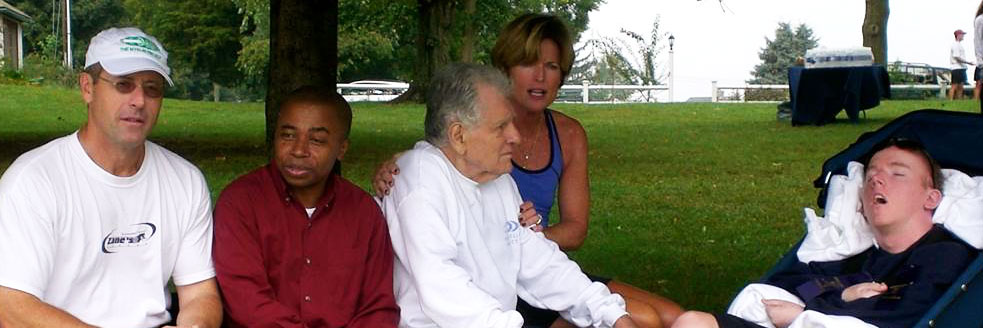Mission Statement
One Dream
Stopping the Progression of ALD: Our hope is that we will someday be able to keep every child with the potential for developing adrenoleukodystrophy (ALD) well.
Three Goals
Promote Awareness of ALD:
Public awareness helps in so many ways. We hope to improve information and resources for parents, families and health care providers; to increase public support; and to catch and hold the attention of legislators. There is no doubt that information is a powerful tool.
Ensure Genetic Screening for All Newborns
Early intervention is critical in order to stop ALD from advancing. The genetic marker has been identified, and screening is available. By making this test part of the recommended universal screening panel for newborns, we can identify any child with the potential for developing ALD so he can get the treatment he needs to stay well. We successfully spearheaded the passage of Senate Bill 465, Public Act No. 13-242 to provide newborn screening for ALD in Connecticut. Governor Malloy signed the new law on July 2, 2013.
Support Advances in Research
Funding dollars are critical. Adrenoleukodystrophy research happens through private support. Currently, Brian’s Hope is funding a study being conducted at the Kennedy Krieger Institute, a center of excellence for ALD, to pursue an exciting, multi-stage research project targeting ALD. This research endeavor, led by Dr. S. Ali Fatemi and Ms. Ann Moser, will further our understanding of the disease, while potentially supporting the development of a new therapeutic approach for patients living with advanced cerebral ALD and AMN, the adult form of ALD.
The specific aims of the project target the very foundation of what’s known about ALD. The research will evaluate the ability of a novel drug-delivery technology (nanodendrimers) to deliver a potent drug, N-Acetylcysteine (NAC), to ALD-affected nerve cells. NAC is considered by leading researchers to be a potentially effective treatment for preventing nerve cell damage in ALD patients. Stage one of this project examines the impact of the technology on cells taken from ALD patients vs. those taken from patients without the disease. Stage two of the project examines the impact of the technology on relevant clinical outcomes in mice that are “pre-programmed” to get the disease. This research will also provide a better understanding of the mechanisms of this devastating disease.
Strength in Numbers
In 2012 Brian’s Hope joined the newly formed ALD-AMN Global Alliance. The mission of the Alliance is to unite like minded charitable foundations from around the world with the common goal to spread awareness, raise money to advance research for treatments and a cure, expand the bone marrow and cord blood registries and provide support, direction, and information to ALD and AMN affected persons and their families. This is a great group of a dozen foundations from the U.S. to Australia and Europe.
The Myelin Project, based in California, is part of the Alliance as well. Jean continues to serve as a member of the Board of Directors for the Myelin Project as she has since 1997. Brian’s Hope supported their successful quest for newborn screening. On September 25, 2014, Governor Brown signed Assembly Bill 1559, making California, (which has the highest birth rate in the country), the fourth state in the US to screen newborns for ALD. We are currently supporting and advocating across the country as other families and foundations work to pass newborn screening for ALD in their states.

In 2006, Augusto Odone visited Hammerfest and he was very grateful to our community for the funds we contributed to The Myelin Project for many years. In his words, Hammerfest was a great day of competition, camaraderie and community. Indeed it is. From left to right: Jack Kelley with Oumouri Hassane (Lorenzo’s caregiver), Augusto Odone, Jean Kelley, and Brian Kelley. In an effort to save their son, Augusto Odone and his wife Michaela discovered the treatment Lorenzo’s Oil and founded the Myelin Project to encourage researchers to work together in an effort to repair or replace myelin. He would be happy to know there is now a newborn screening test for ALD.
About ALD Connect
In 2013, Brian’s Hope and other members of the Alliance joined ALD Connect, a newly formed consortium founded by a dedicated group of clinicians, scientists, patients, and patient advocates. The organization arose out of a collective recognition that only a collaborative network would allow clinical care to keep pace with the many exciting scientific advances in the study of ALD/AMN.
As of July 2013, ALD Connect represents seven clinical centers across North America with plans to incorporate many more ALD/AMN clinicians, scientists, and academic centers both nationally and internationally in the years ahead.
The mission of ALD Connect is to improve health outcomes for individuals with X-linked adrenoleukodystrophy (ALD) by raising disease awareness, empowering patients, and accelerating the translation of scientific advances into better clinical care.
It is exciting and rewarding for Brian’s Hope to be part of both these groups.
